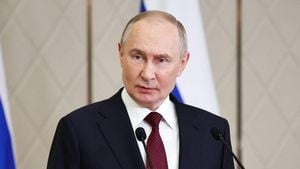The head of Britain's foreign intelligence service, MI6, Richard Moore, recently raised alarms over what he described as an extensive and dangerous campaign of Russian sabotage targeting various nations across Europe. Moore articulated his concerns during discussions with diplomats and intelligence officials, emphasizing the threats posed to Ukraine's allies, namely those standing firm against Russian aggression. He underscored the significance of unity among the Western allies as they maneuver through the current geopolitical crises.
Moore's comments come at a time when tensions between Russia and Western nations are at unprecedented levels, primarily due to the continuing conflict in Ukraine. He warned of the severe repercussions should Russian President Vladimir Putin achieve victory over Ukraine, asserting it would not only endanger European security but the safety of the United States as well. The MI6 chief stated unequivocally, "If Putin is allowed to succeed, our security - British, French, European, and trans-Atlantic - will be jeopardized."
Making these remarks alongside Nicolas Lerner, the head of France's external intelligence agency, DGSE, Moore addressed the stark realities facing their nations. According to Lerner, the collective security of Europe is intricately tied to the resolution of the crisis facing Ukraine. Both intelligence leaders noted the interrelated nature of global security, forming a united front against Russia's provocative actions.
Concerned about Russia's recent activities, Moore mentioned several incidents across Europe, which Western officials suspect are orchestrated sabotage efforts from Moscow. One alarming example reportedly involved the discovery of incendiary devices hidden within packages on cargo planes. A specific incident cited was the ignition of one device at a courier hub in Germany, illustrating how the threats extend beyond Ukraine and pose actual risks to the broader European populace.
Further, investigations related to the crash of a DHL cargo plane near Vilnius, Lithuania, are exploring potential connections to Russian involvement. This incident, which tragically resulted in the death of one crew member, amplifies the urgent need to assess Russia's reach and intentions across Europe. With attempts to destabilize Kyiv’s allies becoming increasingly evident, it's becoming necessary to examine Russia's strategies - ranging from outright attacks to more subtle forms of sabotage.
The discussions about such sabotage haven't been isolated to intelligence meetings; they have rippled outwards, catching the attention of political leaders and the public alike. Moore pointedly criticized the reckless stance of the Russian government, stating, "Such activity and rhetoric is dangerous and beyond irresponsible." The MI6 leader stressed the need for all allies to remain vigilant against the threats looming from the East.
This collaborative surveillance effort between MI6 and DGSE symbolizes the broader, more extensive cooperation among Western intelligence agencies as they work together to counteract the methods employed by the Kremlin. Recognizing the significance of their alliance, both intelligence heads referenced historical instances, like the infamous 2018 Novichok poisoning of Sergei Skripal, as high-stakes lessons from which they can draw insight.
To combat these threats and vulnerabilities, comprehensive intelligence-sharing has become more important than ever. Countries such as the UK and France, both key allies of Ukraine, stand willing to provide advanced weaponry, including missile systems, which can be utilized to protect not only Ukrainian sovereignty but to maintain stability across the continent.
The discussions and revelations surrounding these incidents point to the depth of Russia’s geopolitical ambitions, extending far beyond the borders of Ukraine. They illuminate just how precarious the balance of power is within Europe, particularly as Moscow continues its campaign of intimidation and aggression.
On the other side of the Atlantic, the Biden administration has recently softened its stance on certain military aids, allowing for U.S.-made missiles to be utilized against Russian forces. This shift has led to Ukrainian forces reportedly employing ATACM missiles for strikes on Russian positions for the first time. This not only highlights Ukraine's determination to reclaim lost territories but also serves as a notable complication for Russia's military calculations going forward.
Highlighting the palpable risks, Moore made it clear: "The cost of supporting Ukraine is well-known, but the cost of not doing so would be infinitely higher." These words resonate, especially as the potential for escalation increases with each passing day. With Russian threats of nuclear action now on the table, the stakes could not be larger.
The Kremlin continues to bolster its military capabilities, conducting tests of new ballistic missile systems and issuing ominous warnings about their willingness to act against perceived threats. All this contributes to the growing fears among international security experts about what might come next if the current trends remain unchecked.
Meanwhile, the mixture of Putin’s intimidation tactics and the response from Western allies indicates the lengths to which each side is willing to go. Advocates for stronger action against Moscow are urging those in power to review their policies and take necessary steps to deter future advancements. The reality reflects Moore's grave concerns about potential outcomes—a world where unchecked Russian ambitions could rearrange the geopolitical map.
The stakes have raised public awareness, prompting questioning over existing policies and whether stronger measures need to be enacted. This debate continues among political leaders on either side of the Atlantic, as figures such as Richard Moore assert the need for unity and strategic thinking to maintain peace and order.
Overall, the interplay of intelligence, military preparedness, and diplomatic discourse will determine not just Ukraine's fate but the future of European stability as well. When leaders like Moore and Lerner put their heads together on these pressing matters, it reflects the camaraderie and resolve among allies dedicated to countering threats and promoting collective security.
With Moore’s urgent call for vigilance and cooperation, one thing is clear: the battle against Russian intimidation is far from over, and clarity on the situations necessitates national attentiveness and international partnerships moving forward.



